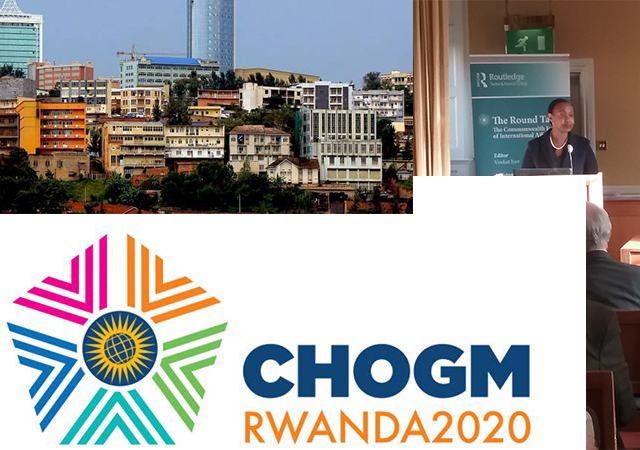 (top left clockwise: Kigali, Rwanda's High Commissioner H.E. Yamina Karitanyi at a January Round Table conference, CHOGM 2020 logo).
(top left clockwise: Kigali, Rwanda's High Commissioner H.E. Yamina Karitanyi at a January Round Table conference, CHOGM 2020 logo).
Rwanda will host the Commonwealth Summit in 2020 bringing together the leaders of over 50 countries, as well as many representatives of Commonwealth organisations, civil society and business. The following year, 2021, it is due to host the biennial conference of the Commonwealth Local Government Forum, CLGF.
Earlier this year the Commonwealth Roundtable held in-depth discussion about Rwanda, its society and politics. An area where the country undoubtedly excels, is in respect of participatory local democracy and decentralised public sector service provision. An earlier Commonwealth Secretariat study showed that Rwanda measures up well against the 2005 Aberdeen Principles on Local Democracy and Good Governance, which form an integral part of the Commonwealth Charter; these deal with such key issues as democratic local elections, accountability, transparency, openness to scrutiny and inclusiveness. At the 2016 local elections moreover 40% of councillors elected were women- well in excess of the Commonwealth target of having 30% women representatives.
Local government in Rwanda has significant areas of responsibilities including such key areas as rural electrification, environmental management, local economic development and tourism, municipal planning, building regulations, public works and transport, social protection, primary health care, and water, sewage and sanitation services. By international standards, performance levels are high and annual performance contracts (imihigo) monitor local government performance against their responsibilities. In addition, there is national oversight through the Ministry of Local Government, the Auditor General, Parliament and the Ombudsman who can address any issues of corruption and citizens complaints.
There are 30 districts (akarere), 416 sector councils (imerenge), 2,148 cell councils (utugari) and 14,837 villages (imudungu) in the country and local government is enshrined in the Rwanda constitution. Villages, cells, and sectors all involve democratic elections and districts are composed of representatives from each sector. The local government have revenue raising powers and derive income from property taxes and licence fees, as well as transfers from central government.
In addition, there are community assemblies (inteko z’abaturage) which met monthly to discuss government policies and resolve domestic disputes in a given community, aided by local mediators (abunzi). On the last Saturday of every month citizens participate in community work (umuganda). Specific channels for local participation include:
- a development forum at district and sector levels
- public accountability days
- citizen participation in budgeting and expenditure processes
- representation of people with disabilities
- programmes to help those living below the poverty line
- policy on social protection targeting the vulnerable and elderly
At national level, the Rwanda Association of Local Government Authorities, RALGA, is the umbrella body and a member of CLGF. Each year a high-level national dialogue meeting is held which brings together the President and local government leaders. There are also quarterly meetings with the Prime Minister, ministers and provincial leaders. A key feature is the agreement of local leaders to a certain set of development targets and in return a national government commitment to provide funding as budgeted.
Authoritative studies have shown that in order to be effective at a least 60% of the 169 diverse Sustainable Development Goal (SDG) targets need to be implemented at local level. The decentralised nature of governance and service provision in Rwanda clearly lends itself to this. Rwanda local government, coordinated by RALGA and supported by CLGF, drawing on EU funding, has been in the forefront of localising the SDGs at the community level. This is seeking to ensure an alignment of District Development Strategies with SDG targets, assisted by an SDG assessment tool and factsheet template to monitor SDG implementation. The country’s commitment to SDG implementation is also shown by the establishment of the new SDG Centre for Africa in Kigali in 2016.
Visitors to Kigali and Rwanda will be confronted by the harrowing memorial sites which commemorate the dreadful genocide of 1994 which claimed up to one million innocent lives, including many women and young children. Overcoming the terrible traumas of 1994 and achieving national healing reconstruction was a difficult task, not least in respect of the subsequent administration of the country-wide justice and reconciliation process. The current highly decentralised and participatory local government system in Rwanda is in part a product and a reflection of the post-genocide efforts to achieve democratic empowerment and reconciliation at the community level. It is also an instrument which aims to ensure that decision-making about vital local series is devolved to local people and to help guard against excessive centralisation of power.
Dr Carl Wright is Secretary-General Emeritus, Commonwealth Local Government Forum and a member of the Editorial Board, Commonwealth Roundtable.



